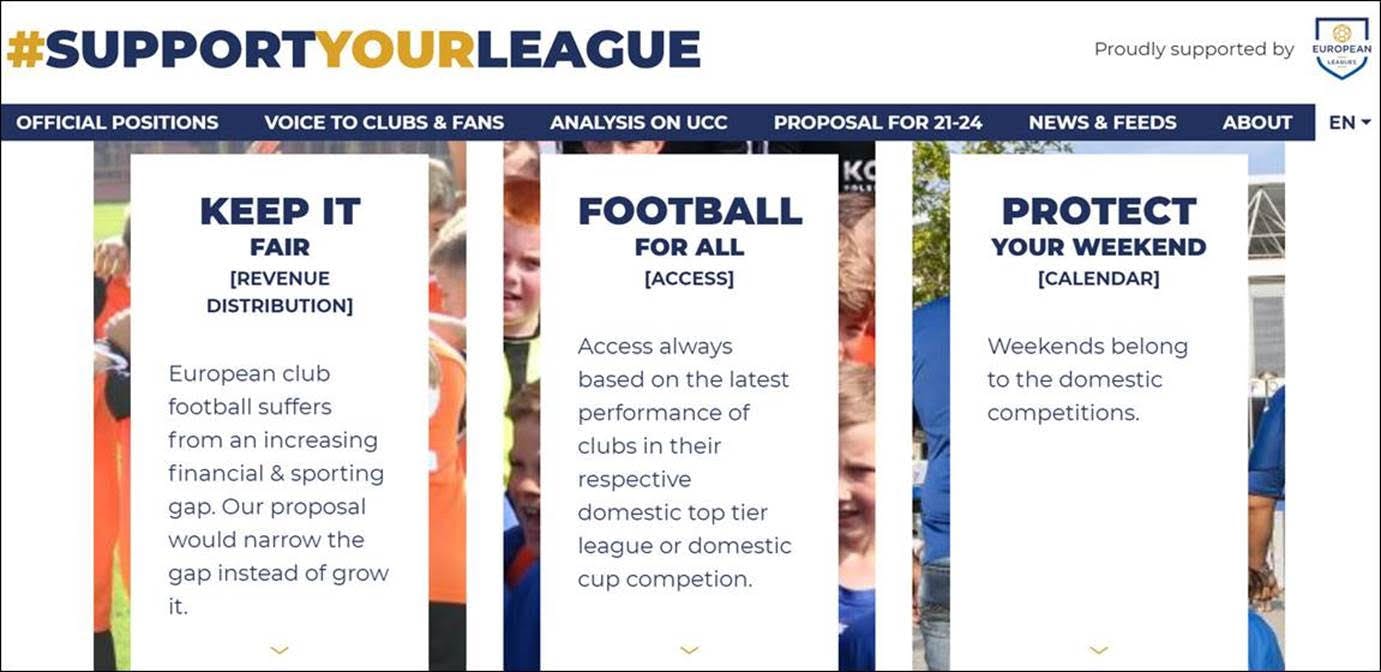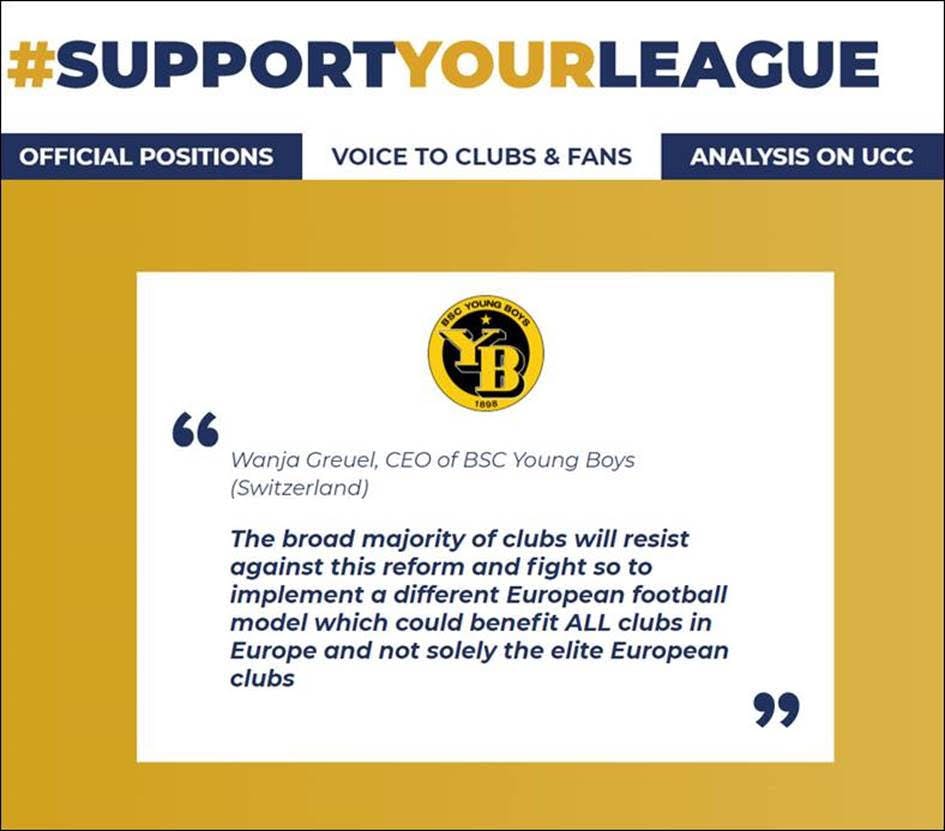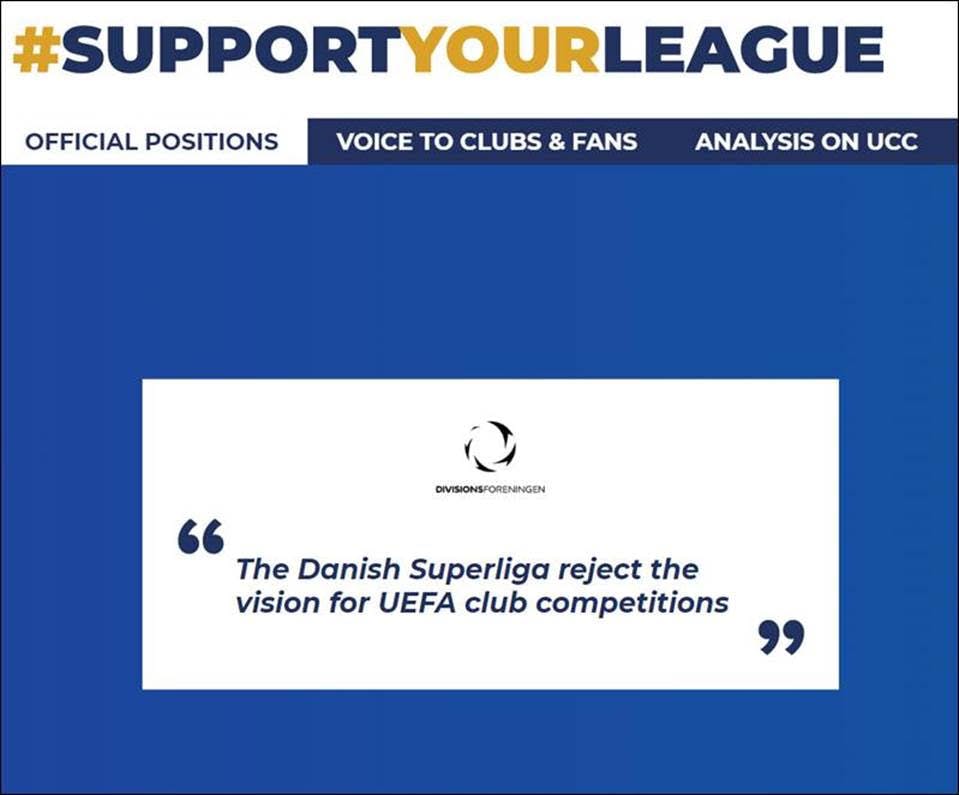Momentum is building against plans to overhaul the Uefa Champions League as a semi-closed competition from 2024, with European Leagues, its members and other stakeholders, including clubs and fan organisations, leading the fight against the dramatic changes.
The proposals by the European Club Association (ECA) and Uefa, European football’s governing body, include the creation of a promotion-and-relegation system between three Uefa Club Competitions (UCCs) – the Champions League, Europa League and a third-tier competition, which would be introduced from the 2021-22 season. Crucially, the semi-closed access to the Champions League, proposed to begin in 2024, would kill the long-held principle of qualification through domestic leagues and threaten to relegate domestic football to an irrelevancy, according to critics.
Uefa and the ECA, a body that represents many of Europe’s biggest clubs, argue that the new structure would offer greater commercial certainty to clubs participating regularly in UCCs.
However, an increasing number of critics, from leagues and clubs all across Europe, claim that the changes would widen the gap between the richest clubs and the rest, leading to a harmful imbalance in income and uncompetitive domestic leagues. They believe European football would become more elitist, instead of for everyone, and destroy the dreams for clubs – outside a small group – of ever advancing to the Champions League.
The level of opposition has forced advocates of the overhaul to go back to the drawing board, with Uefa postponing a planned September meeting with ECA and European Leagues as it continues to receive feedback from across Europe. European Leagues, with the support of its allies, believe their own proposals would safeguard the future of club football on the continent.
‘Unacceptable’ plans
An increasing number of football clubs, fans and leagues across Europe are adding their voices to the debate over the future of the UCC structure.
The European Leagues organisation, which represents more than 900 clubs from 36 professional football leagues and associations, is leading the defence of what it believes is the competitive integrity of domestic competitions across the continent.
This has positioned the organisation against UCC proposals that are endorsed by Uefa and the ECA.
“The vast majority of European clubs believe in our ideas and principle,” says the European Leagues’ deputy general secretary Alberto Colombo, who is also the man behind the #SupportYourLeague campaign.
“The current proposals are supported by a very small group of elite clubs. This group of elite clubs is composed of a few giant European clubs from some big leagues plus those dominant clubs that consistently win their respective domestic championships in a few medium and small countries.
“We do understand that these clubs aim to grow more at international level. Nevertheless, we have the responsibility to defend domestic football and protect the financial and sporting development of all clubs in Europe, including those clubs who do not participate regularly in European competition and all those clubs with no chance at all of qualifying for UCCs.”
In favour of innovation
Colombo insists that European Leagues is open to new strategies and structures when it comes to the continent’s club competitions. However, such alterations have to be for the good of the whole football community.
“European Leagues is in favour of innovations in football, including evolving UCCs,” Colombo says. “However, these must be under the condition that any changes contribute to the growth of professional football as a whole and not just for a very few.”
European Leagues has concerns about several aspects of the proposals.
Colombo says that the changes would close access to European club competitions for many clubs from many leagues – thereby trampling on the “essence of our football system, whereby clubs qualify for UCCs based on their performance in domestic competitions”.
 He adds that “interest, development and growth” would be shifted from domestic to international competitions. He argues that this would devalue domestic tournaments and the vast majority of clubs due to the increased number of matches and matchdays in an already congested calendar, as well as an enlarged competition structure in Europe that would increase the value of the continent-wide tournaments at the expense of domestic leagues.
He adds that “interest, development and growth” would be shifted from domestic to international competitions. He argues that this would devalue domestic tournaments and the vast majority of clubs due to the increased number of matches and matchdays in an already congested calendar, as well as an enlarged competition structure in Europe that would increase the value of the continent-wide tournaments at the expense of domestic leagues.
Additionally, Colombo says that the changes would lead to a wider gap between the elite clubs and the rest across many leagues. This would have a negative impact on the “excitement and predictability of matches and competitions which drive the passion of football fans,” he says.
Colombo adds: “The discussed concept presented by Uefa and supported by the ECA would have unacceptable consequences for all small, medium and big leagues in Europe and should therefore not be implemented in this form.”
Strong opposition comes from leagues around Europe, including LaLiga, and the 20 teams in the English Premier League also adopted a joint stance against the proposed changes, as did all clubs from the Bundesliga. Italian Serie A clubs and French LFP clubs have also voted in favour of a measure to halt the proposals.
In fact, European Leagues’ efforts to protect and enhance the competitive balance across league competitions have drawn support from across the continent, not only from the top leagues. The professional leagues in Denmark, Sweden, Israel, Scotland, Latvia, Switzerland, the Czech Republic, Russia and Belgium – and even non-top tier leagues such as the English EFL and Italian Serie B and Lega Pro – have already issued resolutions and statements rejecting the proposals.
 SupportYourLeague.com
SupportYourLeague.com
With the future direction of European club football at stake, illustrating the depth of opposition to the proposals championed by Uefa and the ECA has been important.
As clubs, fans and leagues increasingly speak out against the proposals, European Leagues has launched a visual platform to underline the widespread level of antipathy towards the plans.
The SupportYourLeague.com website will be a key driver in the #SUPPORTYOURLEAGUE campaign, calling on football’s stakeholders and decision-makers to understand and recognise the key role domestic football plays in the development of the sport and society as a whole.
According to Colombo, it will be a “living platform” that will evolve and be updated constantly, giving leagues, clubs and fans a voice about their ideas for the sustainable development of European club football.
Animated maps will also provide a striking visual lesson of “how strong, consolidated and geographically wide the opposition is towards the current proposal”, Colombo says.
“This project is aimed to inform, educate and engage all football stakeholders, such as fans, clubs, players, domestic leagues, national associations, press and media, broadcasters and other commercial partners about the impactful evolution of UCCs and the threats posed to domestic European leagues and the vast majority of professional clubs by the current proposals for 2024 onwards.”
Fresh proposals
The platform will also help to push European Leagues’ own proposals for the future of UCCs beyond 2024 and ideas to adapt revenue distribution from 2021.
Colombo underlines three areas in which the “vast majority” of European clubs would benefit from his organisation’s distribution plans.
Firstly, there would be a more equitable distribution ratio of centralised income between the three UCCs and between the clubs themselves, avoiding any concentration of revenue for Champions League clubs.
Secondly, Uefa’s club coefficient ranking – which takes into consideration historic results from previous years for revenue distribution, and therefore favours the bigger, more established clubs – would be scrapped.
 Thirdly, European Leagues is calling for a substantial increase in the solidarity payments to clubs, and in particular to non-participating clubs. This step would be “imperative” if the long-term interests of clubs across Europe are to be protected, according to Colombo, who highlighted how teams in smaller leagues currently can become overwhelmingly dominant in domestic competitions relatively quickly due to the imbalance of revenue distribution from the European governing body.
Thirdly, European Leagues is calling for a substantial increase in the solidarity payments to clubs, and in particular to non-participating clubs. This step would be “imperative” if the long-term interests of clubs across Europe are to be protected, according to Colombo, who highlighted how teams in smaller leagues currently can become overwhelmingly dominant in domestic competitions relatively quickly due to the imbalance of revenue distribution from the European governing body.
Colombo adds: “European Leagues’ main goal is to enhance and protect competitive balance in league competition.
“European Leagues believes that it is in the interest of all domestic leagues, all national associations and the vast majority of European clubs to defend and strengthen the competitive balance of football – for the good of the game, the players, the fans and the clubs.”